#Sharon Ferguson
Text
February 18, 2003

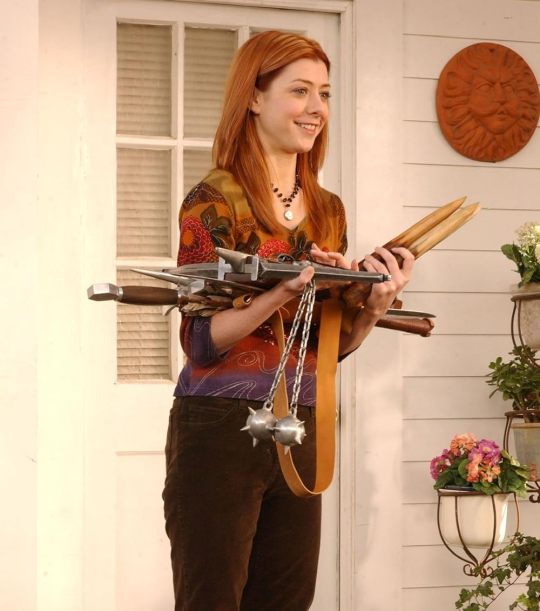
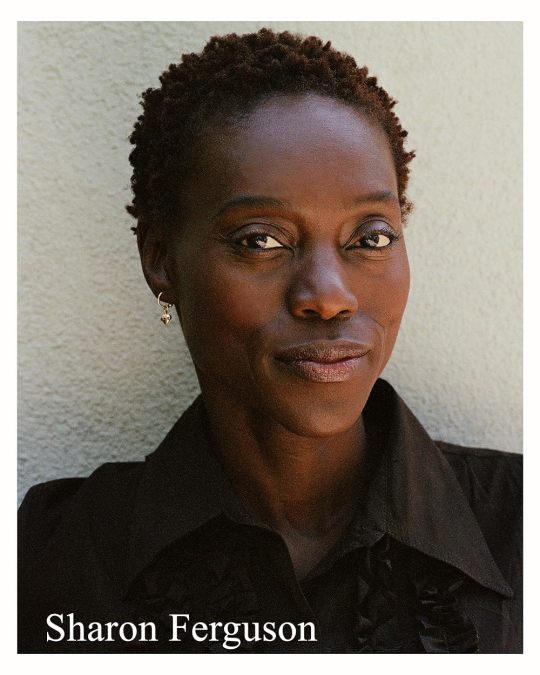
Get It Done aired for BTVS season 7, episode 15. While trying to explain to Principal Wood why a gang of teenage girls (The Potentials) are training in formation in Buffy's backyard, Willow pretends that it's cheer practice. Even though she is carrying a large amount of non-cheerleading weapons.
WILLOW: Oh, hi. Hey. Well, Buffy... I see that our preparation for the school-pep-dance-cheer-drill contest are coming along. (loudly to the potentials) Bring it on!
(mod note: The first Bring It On movie came out in 2000 and starred Eliza Dushku, who plays Faith. Faith will reappear in S7 Sunnydale in a few episodes, following an off-screen car trip with Willow, as they both return from LA.)
This is the last appearance of Sineya. She appeared in three episodes, in S4, S5, and here in S7. Oddly she is credited as "Primitive" even though she has the name Sineya. Sineya is the first Slayer and was played by Sharon Ferguson.
#btvs#ep: 7x15 get it done#willow rosenberg#quote#Sineya#sharon ferguson#month: february#date: 18#year: 2003
11 notes
·
View notes
Text
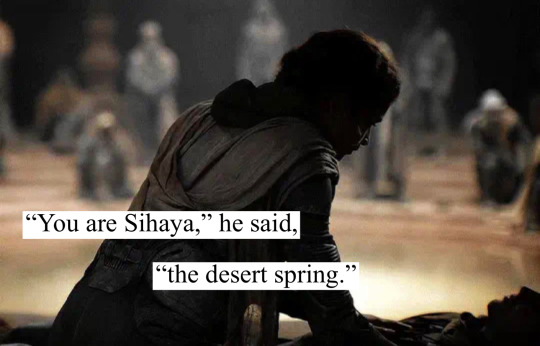
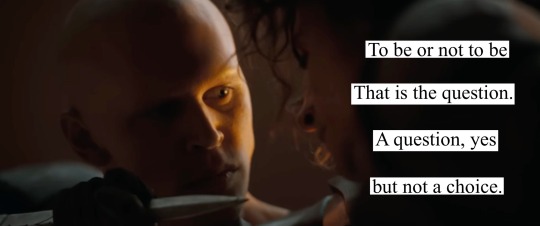








“Nice and neat, tragedy. Restful, too. In a drama, with its traitors, its desperate villains, its innocent victims, avengers, devoted followers and glimmers of hope, death becomes something terrible, a kind of accident. You might have arrived in time with the police. But tragedy's so peaceful! For one thing, everybody's on a par. All innocent! It doesn't matter if one person kills and the other is killed - it's just a matter of casting. And above all, tragedy's restful, because you know there's no lousy hope left. You know you're caught, caught at last like a rat in a trap, with all heaven against you. And the only thing left to do is shout - not moan, or complain, but yell out at the top of your voice whatever it was you had to say. What you've never said before. What perhaps you didn't even know till now… And to no purpose - just so as to tell it to yourself... to learn it, yourself. In drama you struggle, because you hope you're going to survive. It's utilitarian - sordid. But tragedy is gratuitous. Pointless, irremediable. Fit for a king!” —Jean Anouilh, Antigone
#dune 2021#dune 2024#dune part two#frank herbert#ocean vuong#on earth we're briefly gorgeous#ethel cain#andrew kane#catherynne m. valente#sharon olds#jean anouilh#antigone#web weaving#timothee chalamet#zendaya#austin butler#rebecca ferguson#florence pugh#paul atreides#chani kynes#feyd rautha harkonnen#princess irulan#lady jessica#mine#dune
99 notes
·
View notes
Text

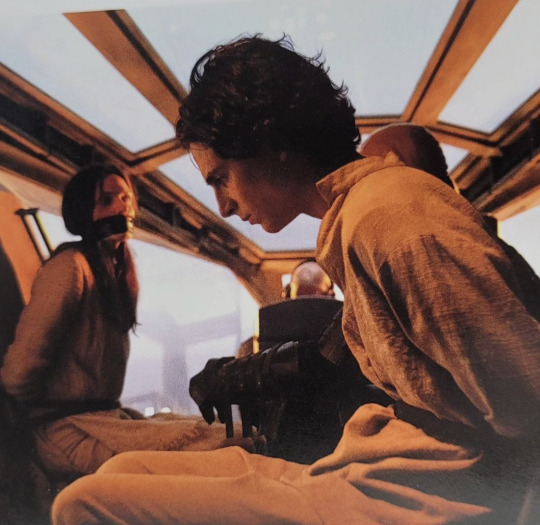

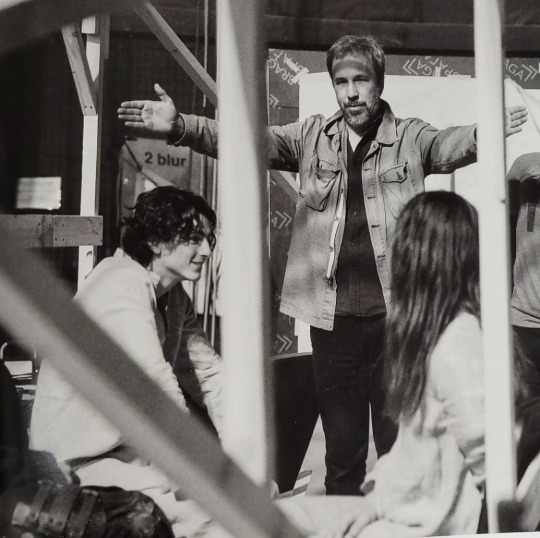
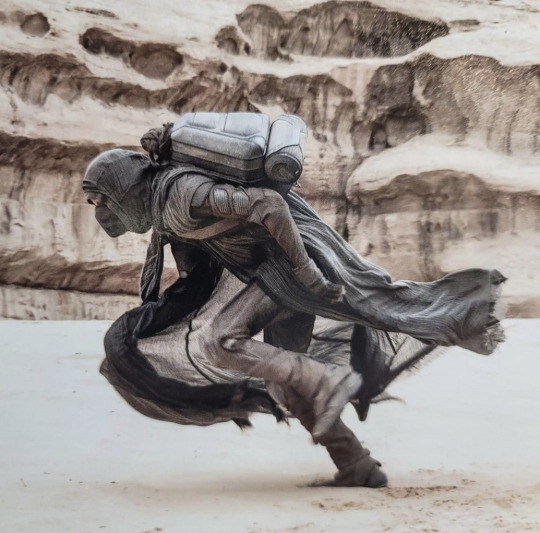

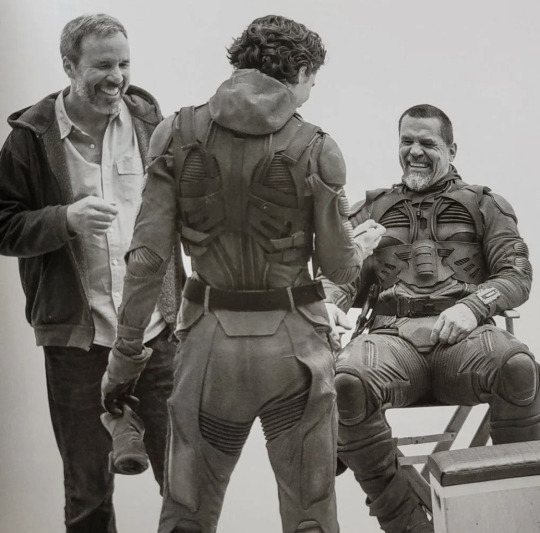
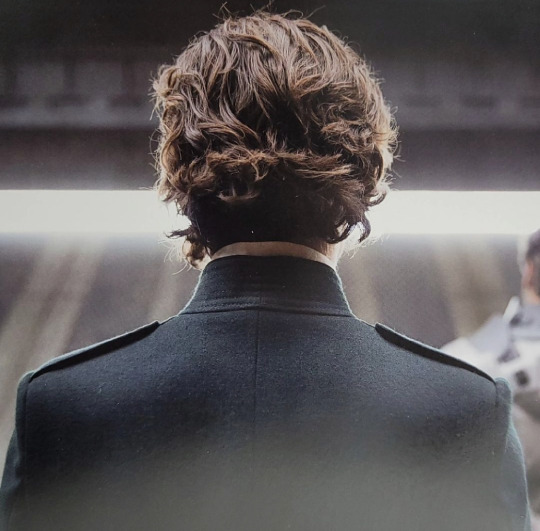
Dune: Part One: The Photography ✨✨✨
📸 by Chiabella James (Twitter: __MilkyTimo)
#timothee chalamet#dune part 1#dune part one: the photography#beautiful photos#timothée chalamet#dune#dune part one#rebecca ferguson#denis villeneuve#josh brolin#sharon duncan brewster#Chiabella James
324 notes
·
View notes
Text


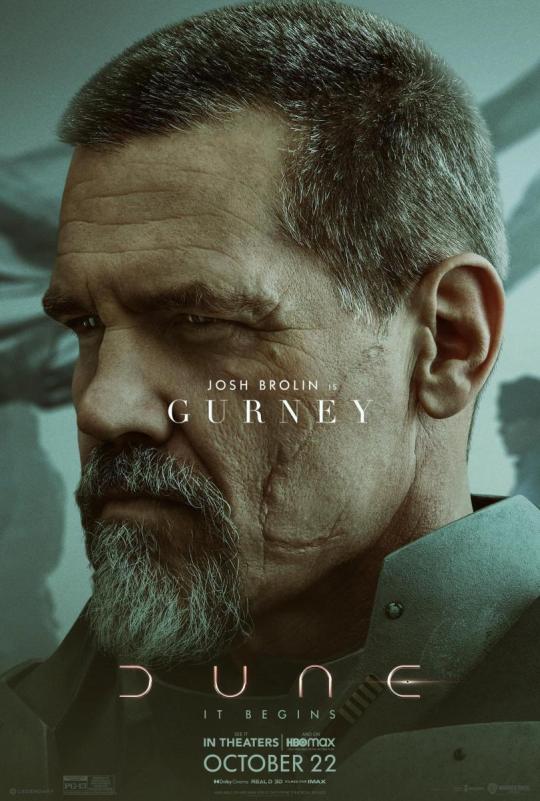
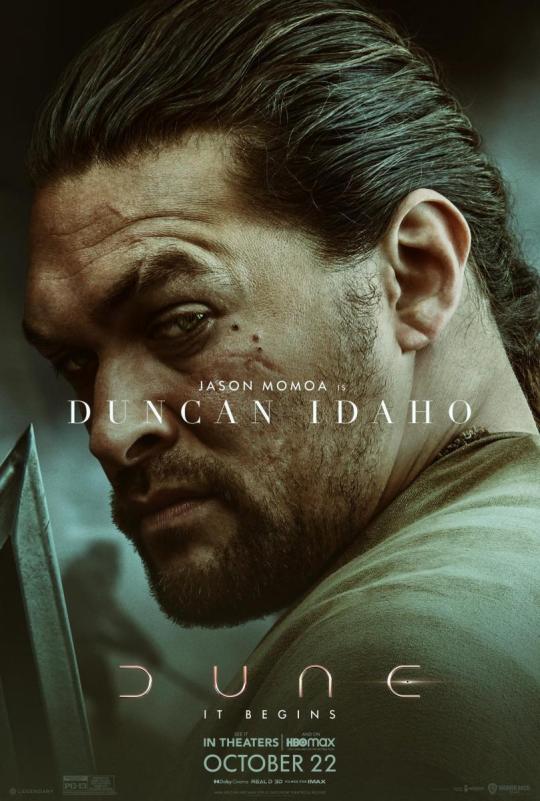

#Dune#Duna#Dune (Primera parte)#Denis Villeneuve#Thimothee Chalamet#Jason Momoa#Stephen McKinley Henderson#Josh Brolin#Chang Chen#Javier Bardem#Zendaya#Rebecca Ferguson#Sharon Duncan-Brewster#Sharon Duncan Brewster#scifi#cifi#ciencia ficción#science fiction#cine#póster#cartel#cinema#movie#film#filme#cinefilia#cinephile#Oscar Isaac
31 notes
·
View notes
Text
Why does Arrakis have another name? And why is that (native) name the title of the book?
So DUNE (novel)'s wiki page cites a quote where Frank Herbert said he chose the title DUNE because it sounds like "Doom", you know , in line with the ecological message of the books.
In addition, I would like to suggest that DUNE is yet another word that he borrows from Arabic, as with so many other references throughout the saga. Just as FREMEN is a worn down version of FREE MEN I believe DUNE is a time eroded version of DUNIYA. According to Google Translate DUNIYA means world in Arabic, Turkish, Corsican, Swahili, Somali, Twi, Zulu, Hausa, Sanskrit, Urdu, Hindi, Bengali, and Yiddish. (I might hv found more instances if I kept on looking.) It seems like a good fit as the Fremen language is full of words with Arabic roots.
Given that Dune is the lesser known name of the planet, it would also make sense to call the novel DUNE if it meant world to Frank. Unless the word DUNE made a big statement (like announcing he's about to give you a whole new world) it makes no sense for Frank to unnecessarily complicate things by giving Arrakis a second name.
Sidenote: the Fremen who initially landed on Arrakis (thousands? of years before the first novel starts) were technicians, scientists, mathematicians, etc who were fleeing the oppression of a slaver- scientist. They couldnt go back to the planet they were captured from and had to make Arrakis their new homeworld out of necessity. In light of that, calling this place their DUNIYA makes sense.
Postscript: there is another layer to the word DUNIYA in that it also refers to the transient nature of the world we live in. In Arabic, it can mean this world as much as it can mean this temporary world. And the original Fremen had initially thought that they would find a way to go back to their home planet and that Arrakis would be a temporary home. So yeah, DUNIYA makes sense in that way too.
Share your thoughts, please!
#dune 2#language#frank herbert#arabic#arrakis#denis villeneuve#dune#sci-fi#science fiction#jason momoa#timothee chalamet#dune 2021#rebecca ferguson#sharon duncan-brewster
114 notes
·
View notes
Photo
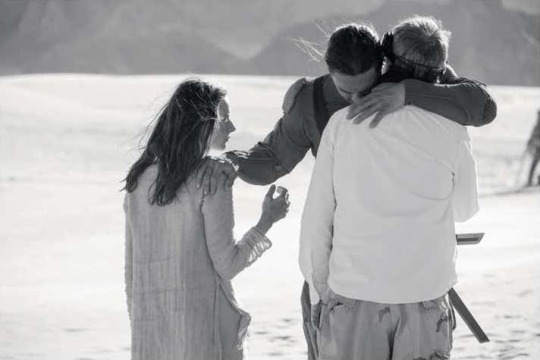

Rebecca Ferguson, Jason Momoa and Denis Villeneuve rehearse a scene.
Sharon Duncan-Brewster and Rebecca Ferguson share a laugh together between takes.
| on set of DUNE (2021) photographed by Chiabella James
#rebecca ferguson#jason momoa#sharon duncan-brewster#denis villeneuve#dunedit#duneedit#dune#behind the scenes#bts#dune bts#scifiedit
62 notes
·
View notes
Text
Dune (2021)
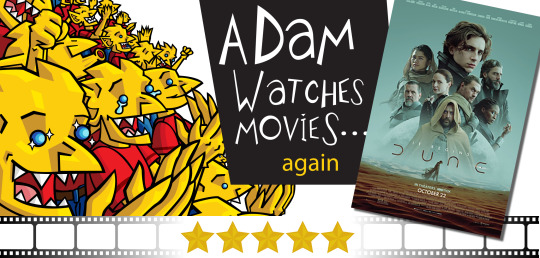
Even upon a rewatch, 2021’s Dune: Part One is spectacular. The memorable, foreboding score by Hans Zimmer, the costumes that bring this world to life, the scale of the action and the unique sets, ship & weapon designs all come together to complement a story of mythical scale. After seeing this film, two thoughts start competing for your brain’s attention. 1) If Frank Herbert’s Dune was adapted this successfully, then no work is unfilmable and 2) the sequel can’t come soon enough.
In 10191, the universe is ruled by an Emperor who assigns the exploitation of planets to powerful ruling houses. Interstellar travel is possible through “spice” a substance found exclusively on the harsh desert planet of Arrakis. For 80 years, Baron Vladimir Harkonnen (Stellan Skarsgård) and his house have overseen the harvest of spice. Now, Duke Leto I (Oscar Isaac) of House Atreides is the new steward of Arrakis but only for as long as the flow of spice continues. This shift puts House Atreides, particularly the Duke’s son, Paul (Timothy Chalamet), in danger.
At 155 minutes, you’d think this movie would feel long, but it doesn’t. One of the reasons is that there’s a lot within to keep your mind busy. What’s a Freman? What’s a Kwisatz Haderach? What’s “the voice”? If director Denis Villeneuve tried to cram this story into 90, or even 120 minutes, it would move so quickly that all these questions would leave you in the dusty sands of Arrakis (that’s the planet, right?). By taking its time while moving at a good pace the film allows you - in time - to answer all of your questions. Since you understand what’s happening, you’re engaged. It helps that if you can’t remember what each name means, the visuals pick up the ball. The grotesque, scheming Baron Vladimir Harkonnen is clearly a villain. It's particularly obvious once you see his nephew, the psychotic and childish Glossu Rabban (Dave Bautista). You know you can’t trust the Bene Gesserit because their leader, Reverend Mother Mohiam (Charlotte Rampling) makes Paul take a painful, life-threatening test to prove he isn’t a threat himself. These are only a few of the many examples I could choose and they show how the story is both complex and easily digestible.
Even without the gripping story filled with backstabbings, political intrigue, violence, quests for revenge and harrowing struggles for survival, Dune would still have you tightly in its grip. Throughout, Paul’s psychic abilities give him visions. They foretell the future… sort of. They give hints of what’s coming but hints are not the same as clear answers. These all tie to this planet he’s on; a world that doesn’t end where the screen does. The details in the dialogue, sets and costumes make you wish the Harkonnens would just chill, and save their grudge for later. This way, you’d have time to see House Atreides befriend the Fremen and familiarize themselves with their customs.
There’s so much happening in this film that some of it you won’t “get” until later. For example, the early assassination attempt on Paul’s life. The would-be killer? A Harkonnen cutthroat, hidden in a bedroom wall. What kind of wealth, power and/or terrifying influence could persuade someone to take on that sort of assignment, knowing they would have to wait in darkness for weeks, slowly starving to death, just to kill a boy?
The passion within Dune is as clear as its ambition. You’re only getting half of a movie with it, but this choice feels like a necessity, rather than a Breaking Dawn-type of cash-grab or an attempt to start another franchise for a money-hungry studio. It certainly doesn’t feel presumptuous. Everything we see feels important; like it’s building up to not just one, but many bigger character arcs in a world that contains hundreds of stories. You know the threads that are left hanging will be tied up - that’s the kind of confidence all of the artists at work instill in you. Dune/Dune: Part One is a film that’s going to be remembered. (March 1, 2024)
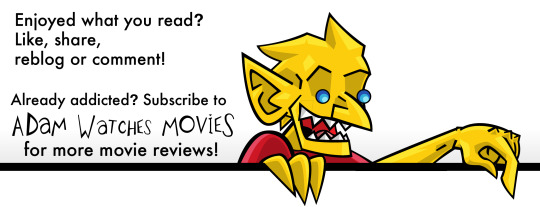
#Dune#movies#films#movie reviews#film reviews#Dune: Part 1#Denis Villeneuve#Jon Spaihts#Eric Roth#Timothee Chalamet#Rbecca Ferguson#Oscar Isaac#Josh Brolin#Stellan Skarsgard#Dave Bautista#stephen mckinley henderson#Zendaya#Chang Chen#Sharon Duncan-Brewster#Charlotte Rampling#Jason Momoa#Javier Bardem#2021 movies#2021 films
8 notes
·
View notes
Text
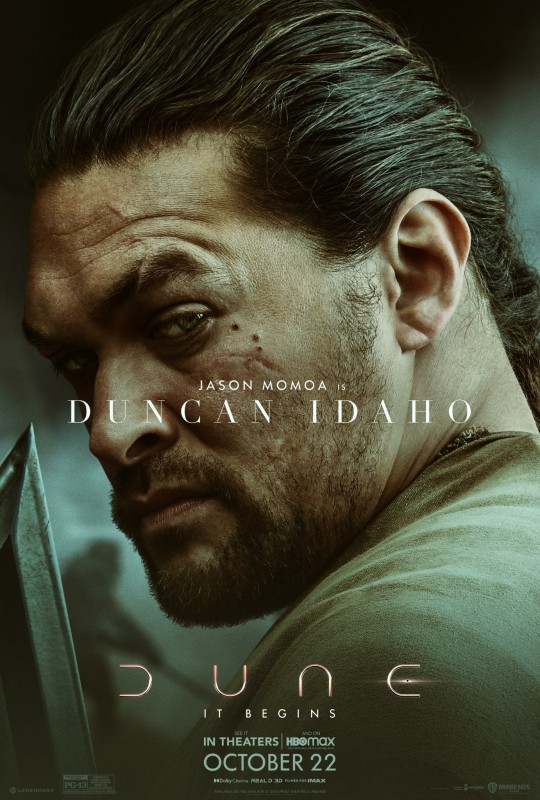




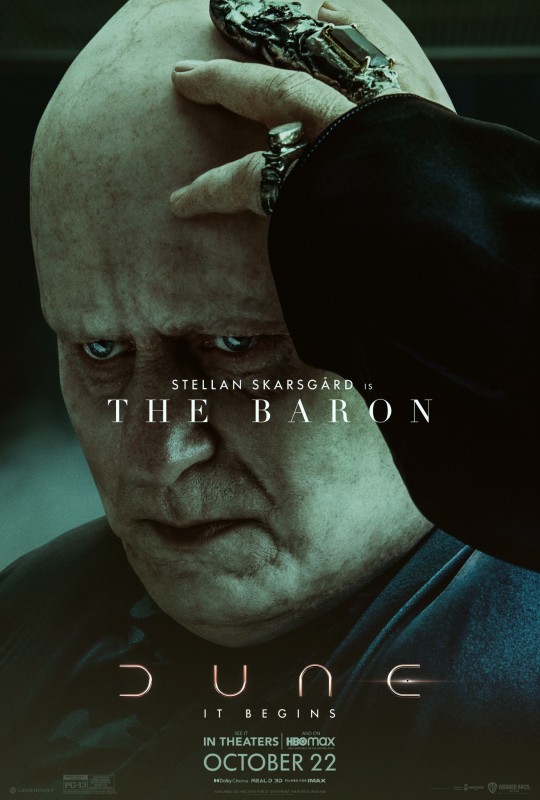
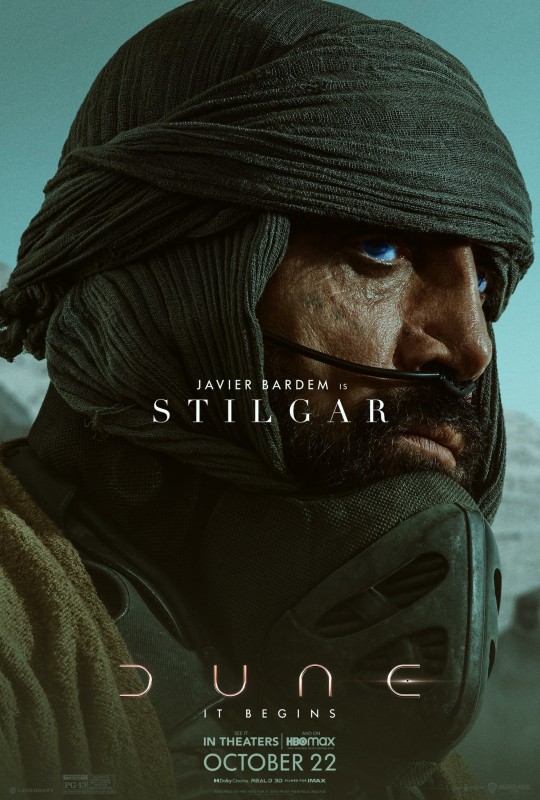

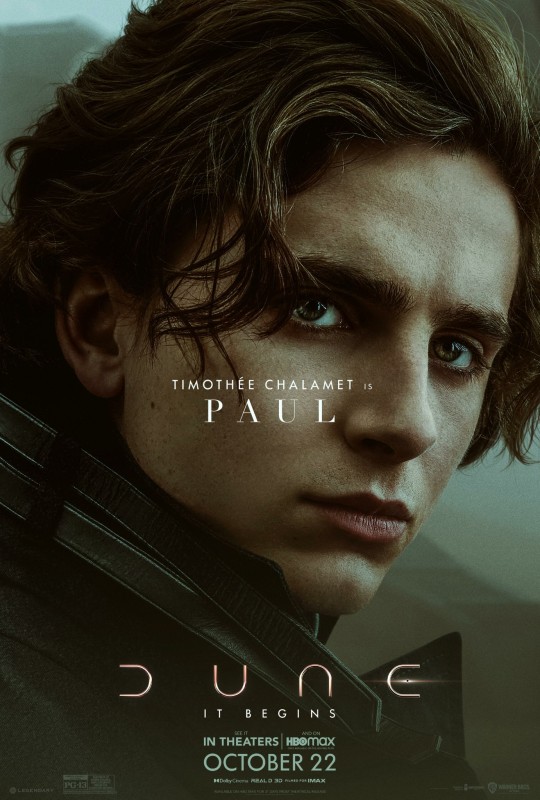
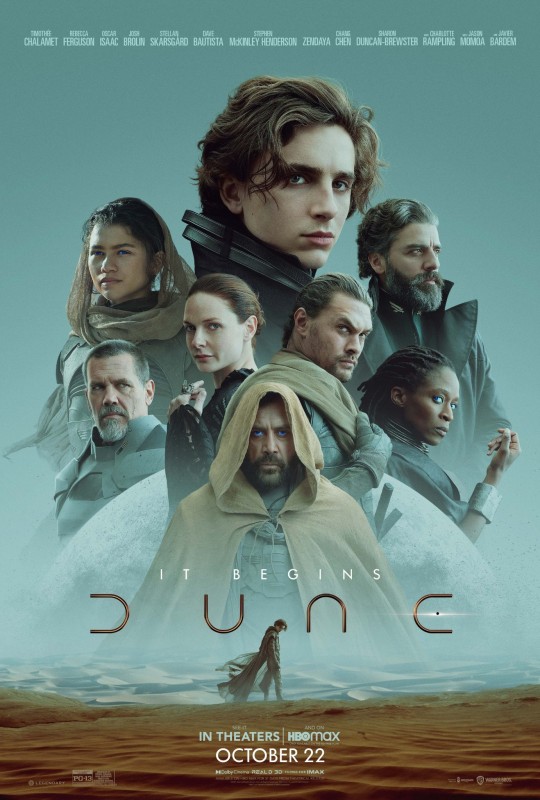
W A T C H I N G
I saw the 1984 version, but it was confusing to me.
I liked 'Dune' & 'Children of Dune' on SyFy channel in the early 2000s, also confusing, but more epic and colorful scale. But I can never find the DVDs of it, and the ones out there are expensive beyond ridiculous pricing!
And Denis Villeneuve is such a visionary, it's still rather 'alien' to understand. But it's very compelling story.
#DUNE (2021)#DENIS VILLENEUVE#FRANK HERBERT#Timothee Chamalet#Rebecca Ferguson#Oscar Isaac#Josh Brolin#Stellan Skarsgård#Dave Bautista#Stephen McKinley Henderson#Zendaya#David Dastmalchian#Chang Chen#Sharon Duncan-Brewster#Charlotte Rampling#Jason Momoa#Javier Bardem#SCI-FI#FANTASY#Babs Olusanmokun#Golda Rosheuvel#Roger Yuan#Benjamin Clementine#EPIC STORY#WATCHING#SCI-FI EPIC
52 notes
·
View notes
Photo

DUNE 2021
I must not fear. Fear is the mind-killer. Fear is the little-death that brings total obliteration. I will face my fear. I will permit it to pass over me and through me. And when it has gone past I will turn the inner eye to see its path. Where the fear has gone there will be nothing. Only I will remain.
#dune#2021#film#favoured#timothee chalamet#rebecca ferguson#oscar isaac#josh brolin#stellan skarsgard#dave bautista#sharon duncan-brewster#stephen mckinley henderson#zendaya#chang chen#charlotte rampling#jason mamoa#javier bardem#david dastmalchian#babs olusanmokun#golda rosheuvel
63 notes
·
View notes
Text
Trailer Oficial: Dune Prophecy
Después del enorme éxito que han sido las cintas de DUNA, Hbo Max, bueno solo MAX ahora, nos trae sin previo aviso esta serie sobre el universo expandido de DUNA, que como podemos ver es la historia antes del mito.
Continue reading Trailer Oficial: Dune Prophecy
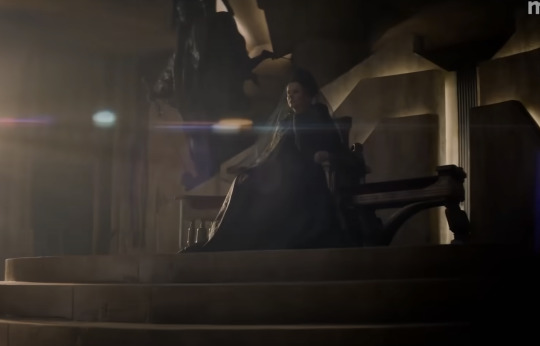
View On WordPress
#critica#Dave Bautista#DUNA#DUNA PARTE II#Dune#Florence Pugh#Jason Momoa#Javier Bardem#Javier Jodorowsky#Josh Brolin#Lea Seydoux#Mick Jagger#Oscar Isaac#Pink Floyd#Rebecca Ferguson#Sharon Duncan#Stellan Skarsgard#TIMOTHÉE CHALAMET#VILLENEUVE#Zendaya
2 notes
·
View notes
Text
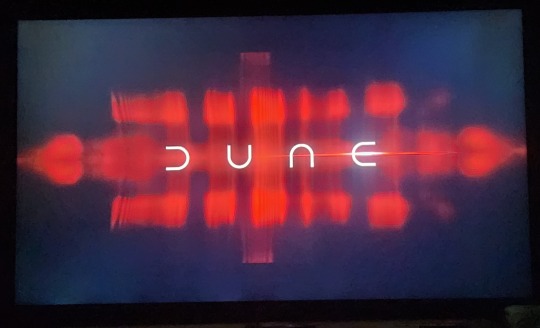
February 24, 2024. 👍 rewatched streaming on Max. I wanted to refresh my memory before seeing Part 2.
#dune movie#denis villeneuve#timothée chalamet#oscar isaac#rebecca ferguson#zendaya#josh brolin#javier bardem#stellan skarsgard#jason mamoa#dave bautista#babs olusanmokun#david dastmalchian#sharon duncan brewster#movies#scifi#movies based on books#hans zimmer
3 notes
·
View notes
Text
Review of Dune: Part One
Hey, Cassipedia, what're you watching?
Recently I re-watched Dune: Part One which is based on the first half of the sci-fi novel Dune by Frank Herbert from 1965. It is referred to as a sci-fi ‘epic’ because of the length and scope of the story, at the center of which is Paul Atreides, the son of a duke of a ruling family that was recently granted ownership of a dangerous desert planet called Arrakis in order to mine ‘Spice,’ a material necessary for space travel, the mining for which has caused unrest among the people of the Fremen who live there already. As jealous former rulers of the planet close in from above, and unfathomably massive sandworms lurk below, all the while a centuries-old plot lies within in veins—his bloodline—this first movie centers around Paul learning to understand what it means to ‘answer the call.’
Do you recommend watching it?
Absolutely. This is an unforgettable experience of a movie, and it’s honestly a bit hard to explain why. It feels like stepping into an alien planet, where there is much that is unfamiliar and that you don’t understand, but the more that you venture in, the more you start to find and compare things to what you do recognize. There is also a straight-forward story at the heart of it, of a young man being thrust into a dangerous world, trying to figure out his purpose and what exactly he’s surviving for, but it connects to these larger questions and uses such unforgettable, almost dream-like visuals that might be possible in the far-future, all accompanied by haunting music and actors who took their roles seriously.
What's the story like?
The two words I would use to describe this movie are these “dignity” and “majesty.” There is size and weight to everything, and the sense that all that is unfolding in the movie is the result of many centuries, far beyond our time and on the edge of our understanding. It takes place in the inconceivably distant future and centers around a dangerous desert planet known as Arrakis, as control of the planet is fought for due to its highly valuable Spice that is used in space travel. The ruling family put in charge by the Emperor of the Imperium to control the Arrakis is House Atreides must fend off the jealous former rulers of the planet, the Harkonnens, all the while simply trying to survive the planet’s killing heat and massive sandworms. The natives to the planet, the Fremen, who’ve been oppressed by the Harkonnens, watch the struggle, waiting to see whether or not House Atreides is the same as their cruel, former-rulers or if the desert will swallow them whole. At the center of it all is the son of the Duke of House Atreides, Paul, whom is uncertain if he will be able to take up the responsibility of eventually taking over for his father. He also carries the burden of a second legacy through his mother, who originates from a secretive order known as the Bene Gesserit, and through Paul, there is an ancient plot to create “a mind that can bridge time and space” to attempt to create a man-made messiah to bring hope to all. He has dreams and visions of the future, and he may have the potential to not only befriend the elusive and mysterious Fremen, but also make way for their improbable dream of turning the deadly Arrakis into a place with flourish plants and water. This may sound complicated, but the story essentially boils down to Paul trying to answer the question of, why does he want to survive? At the core of this story, past all the layers of history and characters struggling against one another, this movie and its story encapsulates the awe-inspiring and humbling situation that is living in an unforgiving environment. I remember watching the short film Nanook of the North as Eskimos staved off the threat of starvation and killing cold and wondering, why are they still living there in such a dangerous place? Is it because it is where they were born? Is it pride? Or something much more than that? I see the Fremen on Arrakis in a very similar way, a people whom have made a home of a deathtrap of a landscape and are doing more than just surviving; they thrive. Just as I asked these questions of Nanook, Paul asks these questions of the Fremen. And in a strange way, when all safety and the comforts and certainties of the old life is stripped away and left with few resources in a nightmarish desert, that seems to be when the true value of life can be best seen.
How are the actors and actresses?
In order for a movie like this to even work, every aspect of it needs to be of its upmost quality. Dune is not an easy story to adapt and its characters are just as heavy with history and layers as its world. I am thrilled to say then that I admire how well the actors portrayed these characters. I think it says something that I did not recognize most of these actors and actresses upon my first viewing, and I only afterwards started to note familiar faces after my viewings of the film afterwards. It is evidence to me that the characters came first before the actors behind the faces ever did. But that isn’t to say that the actors and actresses weren’t fitting for their roles.
Paul Atreides is portrayed by Timothée Chalamet. From the start of the film, he is introduced as someone, though young and restless, is very aware of the responsibility of the burdens on his shoulders and is constantly inquiring and trying to understand, and over the course of the film, he increasingly realizes just how much bigger matters are than he thought. He is thoughtful and empathetic. Just before leaving his home planet into the dangerous unknown of Arrakis, while all the others prepare for the trip, Paul’s preparations are to sit in the grass and to place his hand the water from the beach, as if saying goodbye to simple sights that he may have taken for granted before and is now realizing he might not see again for a long, long time. His heart is in the right place, wanting to help others, but there is much he has yet to learn. This is evidenced when, after finally arriving at his family’s new home base on Arrakis, he talks with a groundskeeper who is watering palm trees and Paul asks if they should remove the trees so the spare water can be given to the people, to which the groundskeeper declines and states, “Old dream.” Paul senses this dream for a better future and he may even have the potential to bring it forth, but the question will be if he can truly bear the immense, crushing weight that is the hopes of an entire planet.
In the face of such a daunting task, one of Paul’s invaluable resources are the loving teachings of his father, Duke Leto Atreides, portrayed by Oscar Isaac. He is the head of House Atreides, and it is very clear from the moment that he first appears on screen that he is a man whom carries himself with dignity and honor, always putting first the wellbeing of others. He has no patience for unnecessary ceremony when it gets in the way of practicality, and he asks nothing of others that he wouldn’t do himself. It is clear that those he holds great expectation for Paul and wishes to see him succeed, Duke Leto remains proud of his son. Duke Leto creates a legacy of honor and grace for Paul to use, to take that next step to his destiny. There is another half to Paul’s resources, and that is through his mother, Lady Jessica, portrayed by Rebecca Ferguson. She is cautious and clever. Being trained by the order of the Bene Gesserit, she is able to command others through a mysterious and powerful technique called ‘The Voice,’ the techniques of which she trains Paul in, preparing him for a destiny of bringing a new hope to all through near unfathomable powers. But there is a clear struggle within her, as all that she does is in the name of protecting her son, and yet, there is a question of if she’s truly given him the means to protect himself or if she’s accidentally given him a way to destroy himself and more, should he fail to rise to the call.
But Paul’s main challenges come from not just the deadly environment of Arrakis or even its inhabitants. The foil to the House of Atreides is that of the House of Harkonnen, under the rule of Baron Vladimir Harkonnen, portrayed by Stellan Skarsgård. Perhaps he was human a long, long time ago. He almost looks human, and a small part of him may still be. At first glance, he appears to simply be an overweight figure, so pale he looks like a corpse. But there is something unearthly monstrous about him, of how he appears to have some kind of cybernetic augmentation that lets his overweight body move like a serpent, and we never fully see the mechanics of it, so our imaginations are left to fill in the blanks. It would almost be less horrifying if he had been born a nightmare, if the way he moved were somehow natural, but it isn’t. There’s an implication that, whatever he did to twist his body into the thing that it is, it was a willing choice. His wants are simple; Arrakis once belonged to him and he wants it back. Whereas Duke Leto keeps every promise, the Baron breaks every promise he makes, always opting into his own self-interest. Though there are so many layers to the story, at the core of it, Dune: Part One is a simple story of good and evil. The moment when the Baron and Duke Leto finally come face-to-face in the film is my absolute favorite moment of the film. I dare not spoil it, but it demonstrates how, for all of the Baron’s hideous power, all it takes for Duke Leto to strike fear into him is but a single word, for while the Baron desperately and jealousy clings to his materialistic empire, Duke Leto is willing to destroy it all and give up everything to protect what is good.
The supporting cast are equally memorable as the main characters. I admired how the movie established the deep connection that Paul had with his weapons master and his father’s war master, Duncan Idaho, portrayed by Jason Momoa, and Gurney Halleck, portrayed by Josh Brolin. Duncan is a full-bred warrior who willingly leaps into danger and his willingness to adapt and never surrender was what made him best suited to try seeking out negotiations with the mysterious Fremen who were not keen on outsiders. He has an amazing scene that demonstrates his incredible fighting spirit, which is driven by his great love for House Atreides and especially Paul, whom he refers to as “my boy” throughout the film. Jason Momoa did an amazing job bring this character to life and channeling his energy into an honorable and relentless warrior. As a kind of foil to Duncan, Gurney Halleck is the loyal and unyielding sword to Duke Leto, hardened by horrific battles, yet he has devoted everything to House Atreides, which includes to Paul, whom is one of the few characters whom he smiles at. He is rigid and follows protocol somewhat to a fault as it makes it difficult for him to adapt to the strange ways of Arrakis and the Fremen, but his faith in his purpose is certain and he never gives less than all he has. The way that these characters feel like extended family members to Duke Leto and his actual family speaks volumes on what kind of rule that the duke has led and how it further contrasts with the detached Harkonnens.
There are many other notable characters and factions, but the one most important to mention is of course the Fremen. People of the desert of Arrakis, whom have become a part of it, and all that they do and how they think and act is shaped by the desert. They are hardened, not necessarily out of cruelty, but rather because they do not waste their energy on frivolous gestures, lest they use up the scarce water in their bodies. A good example of how the Fremen is through Stilgar, portrayed by Javier Bardem. He moves quickly and talks in few, straight-forward words, but each word is with a purpose, carefully and quickly chosen. He does not trust Duke Leto, yet he is willing to hear the man out to let him prove himself that he is different from the former oppressors of his planet. Admittedly, it was surprising how small a role that there was for the Fremen girl Chani, portrayed by Zendaya Maree Stoermer Coleman, in comparison to the others, but I think her role serves more as a teaser of what is to come for the sequel, as the story of Dune had been split in half between movies to fit it all in. And her narration over the opening scene was very well-done and incredibly haunting to me. But this film is at least able to get across the main idea behind the Fremen. They are survivors, completely and utterly. They may seem ruthless in comparison to those of House Atreides, but they are different from the Harkonnens that sacrifice others to save themselves; the Fremen test others, like pushing someone into a pool to make them learn to swim, for in a harsh place like Arrakis, if one is not willing to learn quickly and adapt, then their life is already forfeit. But they are not cold or heartless, they have dreams, dreams of a planet that is no longer a desert, and once their trust is properly earned, it is a bond that cannot ever be broken. Even with the actors and actresses that I haven’t mentioned here, there is no word wasted and no action taken without purpose.
What does the movie look like?
It is a vivid and continuous dream. It is not flashy; it is not marketable. It is taking our understanding of how we see the world and how we imagine the future and stretching it so far forward it starts to become something alien, near unrecognizable, yet, deep down, you know somewhere that it originated from something familiar long, long ago. I had a hard time telling the difference between practical effects and CGI. So many times, I stared at characters standing in elaborate outfits on intricate tiles all the while an abstract pillar of a spaceship casts its shadow, and I couldn’t fathom that what I was seeing doesn’t physically exist; it looked too real not to believe.
The movie talks to the viewer through its visuals, and it is up to the viewer to pay attention. There is no scrolling text or unnatural exposition of characters of things they have grown up with. The characters live their lives as normal and the world of the film exists as it has every day for the past thousands of years, so the deeper understanding of how it works must be visually understood. Allow me to describe an example. Several times throughout the movie, we are told that there is space travel between planets. We see a character announce that a character from another planet is on their way, then it cuts to a shot of a view of the planet from space, while a strange and almost ominous, massive tube floats in space with dozens of small shapes like gnats leaving it, and the following scene then shows a group of ships landing on the planet, indicating that space travel occurred. It wasn’t until the next time that this happened, with showing the same massive tube in outer space with slightly different smaller shapes coming out of it did I finally put together that, whatever that tube was, it was acting as the gateway through which space travel occurred. The film never gives this tube a name, and it never explains how space travel works through it aside from ‘Spice from Arrakis is necessary for space travel.’ A part of me wishes to know, but I realized that I don’t need to know, not that, since it still communicates so much more, such as just how much mining of Spice probably has occur to power that thing, if Spice works as a power source in the way that I assume it does. With only a few scenes and no words directly spoken to me, I find myself a little intimidated by the mystery of the space travel tube, but also in awe of its scope and itching to understand it. All of the machines and settings are like this, with abstract yet distinguishable shapes that visually communicate their purpose but explain little else, almost making them seem more like living beasts than anything.
With how the film explains the necessary minimum, colors are incredibly important in this movie. The soothing grey blue of Paul’s home planet of Caladan, the harsh and neon whites and blacks of the Harkonnen home planet, and the sun-drowned oranges and browns of Arrakis. You always know exactly where you are from simply the colors of the scenery. It further burns the image of everything into my mind, like a dream I can’t forget even after waking up. The scenery is alive. In every scene, there is something being visually communicated, some additional detail about the world to learn if you dig deeper. There is an abstract, futuristic regality to Caladan, like something so far in the future it has somehow reached around to a medieval majesty. In contrast, the planet of the Harkonnens is dark and only lit by colorless white, neon, where all is a more modern abstract, where everything feels expertly and artificially made, something barely human and pretending to be. But at the heart of it all, where these two conflicting visuals are pit against one another is in Arrakis. One of the main themes of the original story of Dune is the indomitable and inescapable presence of nature, where anyone who thinks they can conqueror the sands of Arrakis through brute force shall be another speck swallowed up in its dunes their bodies will never see the light of day, and it is only those whom recognize their powerlessness and accepts it, shall they be able to learn to listen and follow the flow of the sands. Arrakis dares those who dwell on it to learn its ways or risk death. Somehow, this film managed to capture this near-living creature of a planet.
Anything notable about the music?
It is largely ambient. There is a heavy emphasis on using a choir largely consisting of female voices that let out wails in a Persian scale that haunts and drowns out thoughts. There are rusted drums like something skittering across the sand. Orchestral instruments imitate the wails, just as intense but they sound like machines in comparison, getting under your skin in a more invasive way. When I researched the movie afterwards, there were apparently hybrid instruments specifically created for this movie to add to its surreal and otherworldly desert sounds.
If it’s based on a book, should I read that first?
Reading the book first isn’t required. I never heard of Dune prior to this film, and it was the movie that led me to grabbing the book. And it floored me just how much the movie was able to capture. The book of Dune is rich with details and nuance that are difficult to explain in normal conversation much like transfer to visual media in a coherent way. There had been many attempts to adapt the movie in the past. The 2021 version that I’ve been detailing in this review is the one that I was introduced to the series by, though I did afterwards check out the 1984 Dune movie directed by David Lynch, and I personally had trouble finishing the 1984 adaptation. In part, I think the 1984 version interpreted the book as more of a sci-fi psychedelic trip and it also attempted to fit in the dense entirety of the first book of Dune into one movie, which then meant not delving into the moments of the story much. The 2021 version instead only covers the first-half of the Dune first book, which is why the 2021 film is tilted Dune: Part One, and I think the film is much better for that. It is able to dwell and give each important moment the time it needs, though that it’s to say that Dune: Part One wastes any time. Each scene and word spoken offers something useful for the viewer, and it tried to touch upon all of the important elements and themes of the original novel. This film of course couldn’t capture everything from the book, but, considering the abstract nature of some parts, I felt it was understandable and their efforts were still admirable. A good example of changes was the death of the character Dr. Kynes. In the original story, he was a man whom died due to collapsing from exhaustion while a sand bubble of trapped water slowly expanded beneath him and would then explode with the force of dynamite, all the while he talks to an illusion of his deceased father about the ecology of Arrakis due to the hallucinogenic Spice he’s breathing in. In the film, Dr. Kynes was a woman who acted as a distraction for invading forces that were pursuing Paul and she ultimately sacrificed herself in the name of her dream for a better Arrakis. These are widely different in many senses, yet it still captured the heart of the character and scene, which was the character’s passion for ecology being rooted in a desire to see Arrakis no longer simply be a dune, but something greater, something that sounded impossible yet believing in it anyways. The actress Sharon Duncan-Brewster did well in bringing the core essence of the character to life and the scene of her character’s death is another memorable moment in the film. Though I watched the film before reading the book, after the fact, I feel that the movie was very respectful to the original source material and did all it could to bring the surreal majesty to life.
The film is perfectly enjoyable without having read the book, though said book does also have a recommendation from me as well. It is also worth reading if you are wanting a deeper dive into the innerworkings of the world, though I must warn you, the book, similar to the movie, is not going to unnaturally explain things to you. It treats itself as a history book that was pulled from the far future, and it leaves it up to you to follow along.
Who would like this movie most?
I would say that this film may be best enjoyed by young adults and up, or, really for anyone whom would be interested in a movie that wants to challenge you in a meaningful way. It is not trying to market itself to you, but rather earn your respect and your attention. For those who enjoy science fiction, it is so unlike any other sci-fi film that I’ve seen that I would very much recommend it to those also interested in the genre. I think for those whom also enjoy war movies may find this film enjoyable as well since it poses very interesting questions regarding human life that gave me that same sensation that I’ve felt in films based on wartime. Most of all, if you have a passion for film, I very much recommend this because of all the care and effort that went into it, brimming to the seams with techniques to admire. Personally, I also think this film is best to watch with a friend or others, as it helps to have someone to converse about the movie with afterwards to sort your thoughts, and I’ve always had plenty to think and talk over after each viewing. Most lately, I had the pleasure of attending the theater with a friend while a group from the treatment and recovery center MN Adult and Teen Challenge watched the film too. It was mostly a group of adult men, whom kindly paid for my friend’s movie ticket, and, as we were all watching, it amazed me to witness how such an energetic and lively group suddenly became very hushed and focused on the movie, just as enraptured as we were.
Where can I watch it?
Since this film was released back in 2021, it is currently only available for either physical copies in DVD or Blue-ray, or through online streaming. I own a physical copy but lack a DVD player, so I had rewatched the film on Netflix, but it will likely be leaving Netflix soon as Dune: Part Two will be premiering this Thursday, Feb. 27 as of the time of writing this. The other places where the film can be seen are DIRECTV, and TNT, Apple TV, Google Play Movies, Vudu and Amazon Prime. In preparation of Part Two, Part One also had a brief re-release in theaters which is currently ended.
I had originally missed out on seeing Dune: Part One in theaters during the time of release, and I was introduced to the movie through Amazon Prime in the living room of my aunt and uncle’s home. I was glad to get the experience of seeing it in theaters, and I hope to attend the opening for Dune: Part Two. However, when comparing the experiences, I do think the film is very enjoyable, at home in a place where you are able to better control the noise. There are many quiet moments in this film and the silence is just as distinct as the soundtrack. If you are able to watch Part One at home and you find that you’ve enjoyed it, then I encourage getting to theaters to see Part Two, to determine if you would like that sequel at home as well.
Final thoughts?
This is a film that will stay with me for a long time and one that’s so rich with detail, I plan on watching it many more times just to soak everything in. This film had challenged me to really consider how I’m spending my time and what I’m applying myself to, to pursue a meaningful creativity and admiration for surviving in harsh conditions and living with purpose. I encourage you to venture out into these treacherous sands of Dune: Part One, and to see just what the you end up learning about yourself.
#dune#dune part one#dune part 1#dune film#paul atreides#timothée chalamet#duke leto atreides#oscar isaac#lady jessica#rebecca ferguson#baron vladimir harkonnen#stellan skarsgard#duncan idaho#jason momoa#gurney halleck#josh brolin#stilgar#javier bardem#sharon duncan brewster#dr. kynes#cassipedia#film review#movie review#cinema#film#movies
4 notes
·
View notes
Text
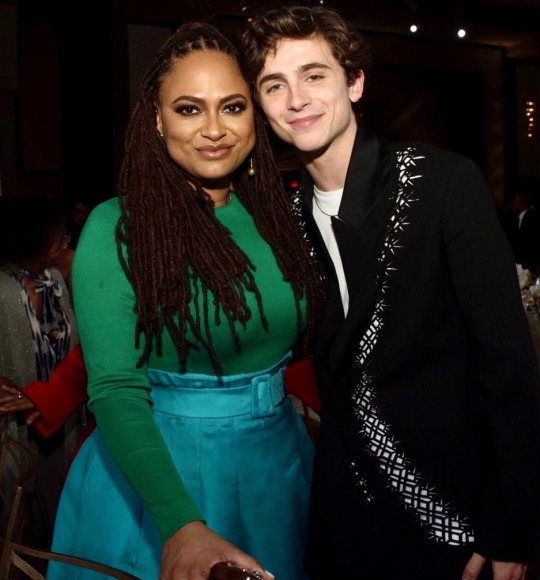


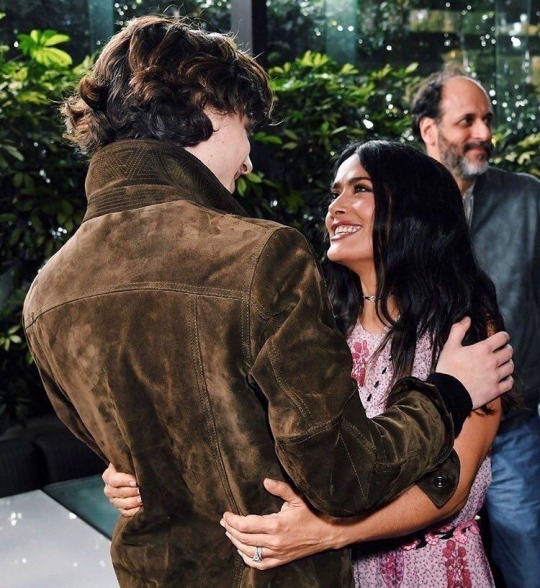

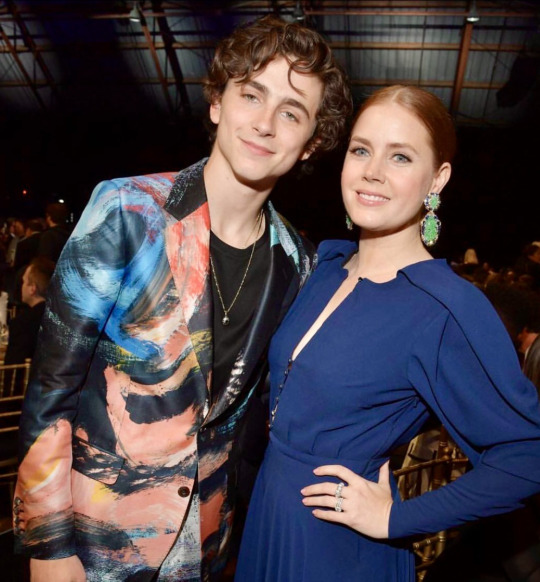

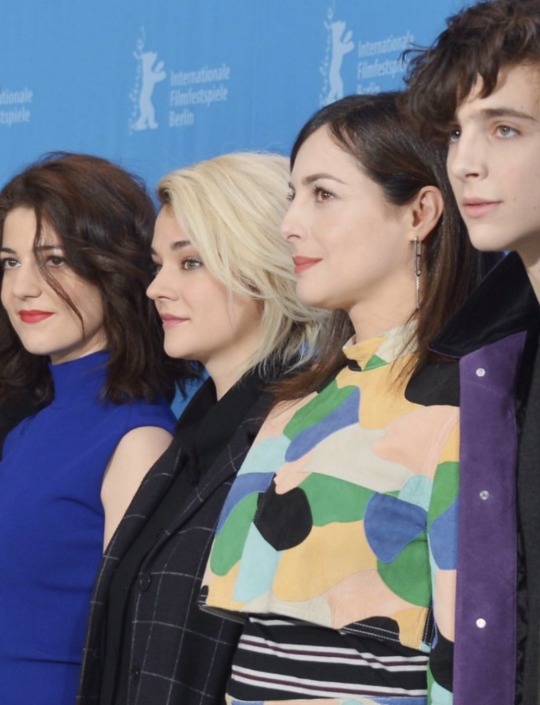

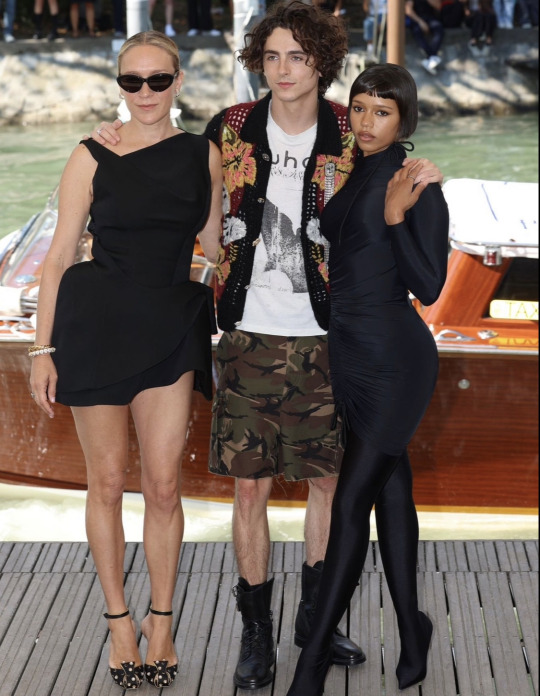
Happy International Women's Day!
#timothee chalamet#international women’s day#timothée chalamet#pauline chalamet#nicole flender#ava duvernay#salma hayek#march 8#saoirse ronan#greta gerwig#amy adams#chloe sevigny#taylor russell#florence pugh#lyna khoudri#sharon duncan brewster#rebecca ferguson#zendaya#zendaya coleman#esther garrel#victoire du bois#danai gurira#amira casar#janelle monae#lupita nyong'o#women’s day#cmbyn#call me by your name#little women#bones and all
155 notes
·
View notes
Text
youtube
DUNE (2021)
Grade: B
I was a little slow coming around to it, but the 2nd half is great after they develop the char's a little. The last 20 minutes or so leaves wanting more. Don't waste your time watching the OG version ever. The score is low-key pushes this film.
#Dune#2021#Sci-Fi Films#Drama Films#Based on a Book#Denis Villeneuve#Adventure Films#Action Films#War#Space#Timothée Chalamet#Rebecca Ferguson#Oscar Isaac#Zendaya#Jason Momoa#Stellan Skarsgård#Stephen McKinley Henderson#Josh Brolin#Sharon Duncan-Brewster#Javier Bardem#Dave Bautista#Chang Chen#David Dastmalchian#Charlotte Rampling#Benjamin Clémentine#Golda Rosheuvel#Babs Olusanmokun#Souad Faress#Mind Control#Planets
7 notes
·
View notes
Text
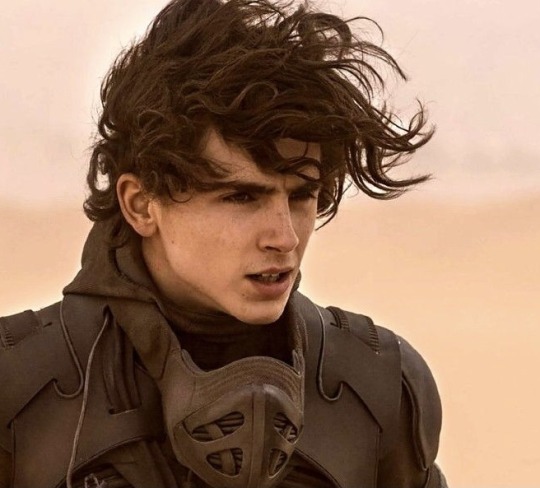
Bevor wir uns jetzt demnächst damit befassen müssen, wie es denn mit unserer besonders niedlichen messianischen Heilsgestalt in Dune weitergeht, rekapitulierten wir nochmal den Anfang. Dafür, daß es bloß der Anfang ist, ist es recht spektakulär.
#Dune#Timothée Chalamet#Rebecca Ferguson#Oscar Isaac#Stellan Skarsgård#Charlotte Rampling#Zendaya#Sharon Duncan-Brewster#Chang Chen#Javier Bardem#Film gesehen#Denis Villeneuve
3 notes
·
View notes
